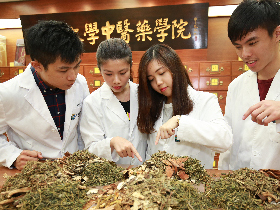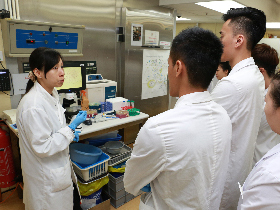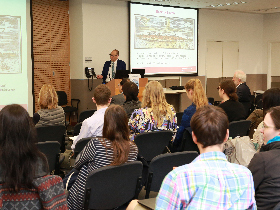Teaching Staff

Dr Fan Cheung
Assistant Lecturer
School of Chinese Medicine,
Li Ka Shing Faculty of Medicine,
The University of Hong Kong
School of Chinese Medicine,
Li Ka Shing Faculty of Medicine,
The University of Hong Kong
- (852) 3917 6450
- (852) 2872 5476
- ofcheung@hku.hk
SPOKEN LANGUAGES
Cantonese, Mandarin and English
WRITTEN LANGUAGES
Chinese and English
ACADEMIC QUALIFICATIONS
| 2011 - 2015 | PhD, School of Chinese Medicine, The University of Hong Kong |
| 2008 - 2010 | Master of Chinese Medicine, The University of Hong Kong |
| 2001 - 2006 | Bachelor of Chinese Medicine, The University of Hong Kong |
PROFESSIONAL QUALIFICATION
| 2006 | Certificate of Registration for Chinese Medicine Practitioner, Chinese Medicine Council of Hong Kong |
WORK EXPERIENCE
| 2022.08 – present | Assistant Lecturer, School of Chinese Medicine, The University of Hong Kong |
| 2016.01 – 2019.07 | Post-doctoral Fellow, School of Chinese Medicine,The University of Hong Kong |
| 2010.01 – 2010.12 | Visiting Scholar / Research Assistant, School of Chinese Medicine, The Chinese University of Hong Kong |
| 2006.10 – 2009.12 | Registered Chinese Medicine Practitioner, Yan Oi Tong |
RESEARCH INTEREST AND ACHIEVEMENT
RESEARCH INTEREST
Chinese medicine for liver diseases, tumors and metabolic disorders
Chinese medicine education
SELECTED PUBLICATIONS
Publications
- Cheung F, Lampe H, Tan CW, Henze L, Zhang C, Felser S, Murua Escobar H, Wang N, Junghanss C, Feng Y. Effect of an inter-professional exchange training program to enhance medical education in oncology: A pretest and posttest study. (Under review)
- Li L, Tam CW, Wang N, Cheung F, Zhou Q, Zhang C, Cheng CS, Xiong L, Feng Y. Effectiveness of blending E-learning with field trip on Chinese herbal medicine education: quasi-experimental study. BMC Complementary Medicine and Therapies 2020, 20(1):248.
- Chan YT, Cheung F, Zhang C, Fu B, Tan HY, Norimoto H, Wang N, Feng Y. Ancient Chinese Medicine Herbal Formula Huanglian Jiedu Decoction as a Neoadjuvant Treatment of Chemotherapy by Improving Diarrhea and Tumor Response. Frontiers in Pharmacology 2020,11:252.
- Huang J, Guo W, Cheung F, Tan HY, Wang N, Feng Y. Integrating Network Pharmacology and Experimental Models to Investigate the Efficacy of Coptidis and Scutellaria Containing Huanglian Jiedu Decoction on Hepatocellular Carcinoma. The American Journal of Chinese Medicine 2020, 48(1):161-182.
- Guo W, Huang J, Wang N, Tan HY, Cheung F, Chen F, Feng Y. Integrating Network Pharmacology and Pharmacological Evaluation for Deciphering the Action Mechanism of Herbal Formula Zuojin Pill in Suppressing Hepatocellular Carcinoma. Frontiers in Pharmacology 2019,10:1185.
- Fu B, Wang N, Tan HY, Li S, Cheung F, Feng Y. Multi-Component Herbal Products in the Prevention and Treatment of Chemotherapy-Associated Toxicity and Side Effects: A Review on Experimental and Clinical Evidences. Frontiers in Pharmacology 2019, 9:1394.
- Li S, Tan HY, Wang N, Cheung F, Hong M, Feng Y. The Potential and Action Mechanism of Polyphenols in the Treatment of Liver Diseases. Oxidative Medicine and Cellular Longevity 2018, 2018:8394818.
- Zhang HW, Lin ZX, Cheung F, Cho WC, Tang JL. Moxibustion for alleviating side effects of chemotherapy or radiotherapy in people with cancer. The Cochrane Database of Systematic Reviews 2018, 11:CD010559.
- Huang J, Li L, Cheung F, Wang N, Li Y, Fan Z, Yin F, Yang J, Gao R, He Y, Feng Y. Network Pharmacology-Based Approach to Investigate the Analgesic Efficacy and Molecular Targets of Xuangui Dropping Pill for Treating Primary Dysmenorrhea. Evidence-Based Complementary and Alternative Medicine 2017, 2017:7525179.
- Huang J, Cheung F, Tan HY, Hong M, Wang N, Yang J, Feng Y, Zheng Q. Identification of the active compounds and significant pathways of yinchenhao decoction based on network pharmacology. Molecular Medicine Reports 2017, 16(4):4583-4592.
- Hong M, Li S, Tan HY, Cheung F, Wang N, Huang J, Feng Y. A Network-Based Pharmacology Study of the Herb-Induced Liver Injury Potential of Traditional Hepatoprotective Chinese Herbal Medicines. Molecules 2017, 22(4). pii: E632.
- Hong M, Li S, Wang N, Tan HY, Cheung F, Feng Y. A Biomedical Investigation of the Hepatoprotective Effect of Radix salviae miltiorrhizae and Network Pharmacology-Based Prediction of the Active Compounds and Molecular Targets. International Journal of Molecular Sciences 2017, 18(3). pii: E620.
- Hong M, Tan HY, Li S, Cheung F, Wang N, Nagamatsu T, Feng Y. Cancer Stem Cells: The Potential Targets of Chinese Medicines and Their Active Compounds. International Journal of Molecular Sciences 2016,17(6). pii: E893.
- Li S, Tan HY, Wang N, Hong M, Li L, Cheung F, Feng Y. Substitutes for Bear Bile for the Treatment of Liver Diseases: Research Progress and Future Perspective. Evidence-Based Complementary and Alternative Medicine 2016, 2016:4305074.
- Lam P, Cheung F, Tan HY, Wang N, Yuen MF, Feng Y. Hepatoprotective Effects of Chinese Medicinal Herbs: A Focus on Anti-Inflammatory and Anti-Oxidative Activities. International Journal of Molecular Sciences 2016,17(4):465.
- Tan HY, San-Marina S, Wang N, Hong M, Li S, Li L, Cheung F, Wen XY, Feng Y. Preclinical Models for Investigation of Herbal Medicines in Liver Diseases: Update and Perspective. Evidence-Based Complementary and Alternative Medicine 2016, 2016:4750163.
- Wang X, Wang N, Cheung F, Lao L, Li C, Feng Y. Chinese medicines for prevention and treatment of human hepatocellular carcinoma: current progress on pharmacological actions and mechanisms. Journal of Intergrative medicine 2015, 13(3):142-64.
- Wang N, Feng Y, Tan HY, Cheung F, Hong M, Lao L, Nagamatsu T. Inhibition of eukaryotic elongation factor-2 confers to tumor suppression by a herbal formulation Huanglian-Jiedu decoction in human hepatocellular carcinoma. Journal of Ethnopharmacology 2015,164:309-18.
- Wang N, Feng Y, Tan HY, Cheung F, Hong M, Lao L, Nagamatsu T. Inhibition of eukaryotic elongation factor-2 confers to tumor suppression by a herbal formulation Huanglian-Jiedu decoction in human heptaocellular carcinoma. Journal of Ethnopharmacology 2015, 164:309-318.
- Wang X, Feng Y, Wang N, Cheung F, Tan HY, Zhong S, Li C, Kobayashi S. Chinese medicines induce cell death: the molecular and cellular mechanisms for cancer therapy. Biomed Research International 2014; 2014:530342. doi: 10.1155/2014/530342.
- Wang N, Feng Y, Cheung F, Wang XB, Zhang ZJ, Feng Y. A Chinese medicine formula Gegen Qinlian Decoction suppresses expansion of human renal carcinoma with inhibition of matrix metalloproteinase-2. Integrative Cancer Therapies 2015, 14(1):75-85.
- Cheung F, Wang X, Wang N, Yuen MF, Ziea TC, Tong Y, Wong VT, Feng Y*. Chinese medicines as an adjuvant therapy for unresectable hepatocellular carcinoma during transarterial chemoembolization: A meta-analysis of randomized controlled trials. Evidence-based Complementary and Alternative Medicine 2013; 2013:487919.
- 陳雷, 張凡, 馮奕斌. 中醫藥防治原發性肝癌的臨床研究進展. Hong Kong Journal of Traditional Chinese Medicine 2013.
- Wang N, Feng Y, Cheung F, Chow OY, Wang XB, Su W, Tong Y. A Comparative Study on the Hepatoprotective Action of Bear Bile and Coptidis Rhizoma Aqueous Extract on Experimental Liver Fibrosis in Rats. BMC Complementary and Alternative Medicine 2012, 12(1): 239.
- Wang XB, Feng Y, Wang N, Cheung F, Wong CW. Recent Progress on Anti-Liver Fibrosis Candidates in Patents of Herbal Medicinal Products. Recent Patents on Food, Nutrition & Agriculture 2012, 4(2):91-106.
- Cheung F, Feng Y, Wang N, Yuen MF, Tong Y, Wong VT. Effectiveness of Chinese herbal medicine in treating liver fibrosis: a systematic review and meta-analysis of randomized controlled trials. Chinese Medicine 2012, 7(1):5.
- Feng Y, Wang N, Ye X, Li H, Feng Y, Cheung F, Nagamatsu T. Hepatoprotective effect and its possible mechanism of Coptidis rhizoma aqueous extract on carbon tetrachloride-induced chronic liver hepatotoxicity in rats. Journal of Ethnopharmacology 2011,138(3):683-690.
Books
- 主編:馮奕斌; 張凡為編寫人員之一。《基礎與臨床中藥毒理學》(2022年第2版)。香港:商務印書館(香港)有限公司
- 主編:徐宏喜、朱國福、馮奕斌 ; 副主編:譚紅勝、郭成旭、王寧、汪選斌; 編委:按主編順序填入-王寧、汪選斌、馮奕剛、李紅運、張凡、陳可瑜、洪明、黎磊、李莎、王蕾蕾、李洪亮、張秋芳、郝新才、王佳。《常用抗腫瘤中草藥的現代研究及臨床應用》(2018)。上海:上海科學技術出版社。
- Tan HY, Wang LL, Cheung F, Wang N, Feng Y. Phytochemistry, Pharmacology And Therapeutics Of Coptis: Panacea For Multiple Diseases?. In Gupta, VK (Ed.), Medicinal Plants: Phytochemistry, Pharmacology And Therapeutics, v. 4, p. 1-39. New Delhi: Daya Publishing House, 2016
- Feng YG, Wang N, Cheung F, Zhu M, Li H, Feng Y. Molecular and cellular mechanism studies on anticancer effects of Chinese medicines. In Olsztynska, S (Ed.), Biomedical engineering, trends, research and technologies, p. 332-362. Rijeka, Croatia: InTech, 2011








